The Intel Kaby Lake-X i7 7740X and i5 7640X Review: The New Single-Threaded Champion, OC to 5GHz
by Ian Cutress on July 24, 2017 8:30 AM EST- Posted in
- CPUs
- Intel
- Kaby Lake
- X299
- Basin Falls
- Kaby Lake-X
- i7-7740X
- i5-7640X
Civilization 6
First up in our CPU gaming tests is Civilization 6. Originally penned by Sid Meier and his team, the Civ series of turn-based strategy games are a cult classic, and many an excuse for an all-nighter trying to get Gandhi to declare war on you due to an integer overflow. Truth be told I never actually played the first version, but every edition from the second to the sixth, including the fourth as voiced by the late Leonard Nimoy, it a game that is easy to pick up, but hard to master.
Benchmarking Civilization has always been somewhat of an oxymoron – for a turn based strategy game, the frame rate is not necessarily the important thing here and even in the right mood, something as low as 5 frames per second can be enough. With Civilization 6 however, Firaxis went hardcore on visual fidelity, trying to pull you into the game. As a result, Civilization can taxing on graphics and CPUs as we crank up the details, especially in DirectX 12.
Perhaps a more poignant benchmark would be during the late game, when in the older versions of Civilization it could take 20 minutes to cycle around the AI players before the human regained control. The new version of Civilization has an integrated ‘AI Benchmark’, although it is not currently part of our benchmark portfolio yet, due to technical reasons which we are trying to solve. Instead, we run the graphics test, which provides an example of a mid-game setup at our settings.
At both 1920x1080 and 4K resolutions, we run the same settings. Civilization 6 has sliders for MSAA, Performance Impact and Memory Impact. The latter two refer to detail and texture size respectively, and are rated between 0 (lowest) to 5 (extreme). We run our Civ6 benchmark in position four for performance (ultra) and 0 on memory, with MSAA set to 2x.
For reviews where we include 8K and 16K benchmarks (Civ6 allows us to benchmark extreme resolutions on any monitor) on our GTX 1080, we run the 8K tests similar to the 4K tests, but the 16K tests are set to the lowest option for Performance.
For all our results, we show the average frame rate at 1080p first. Mouse over the other graphs underneath to see 99th percentile frame rates and 'Time Under' graphs, as well as results for other resolutions. All of our benchmark results can also be found in our benchmark engine, Bench.
MSI GTX 1080 Gaming 8G Performance
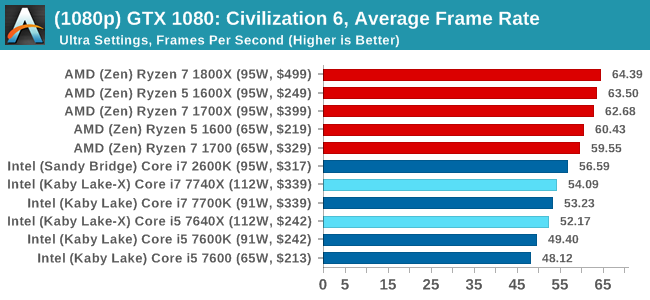
1080p

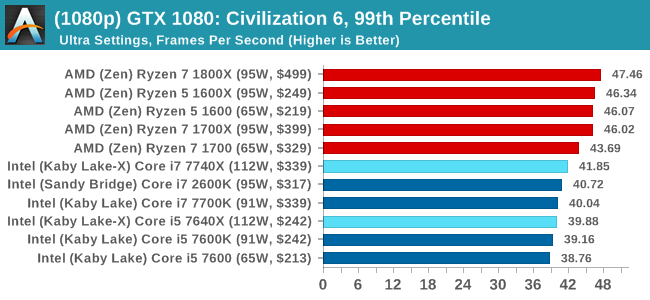
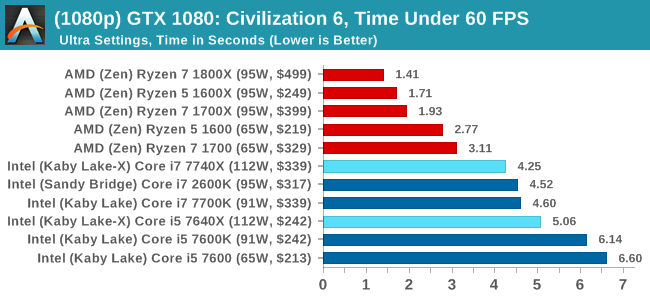
4K
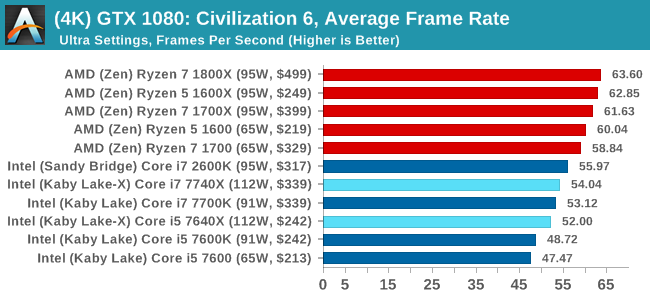
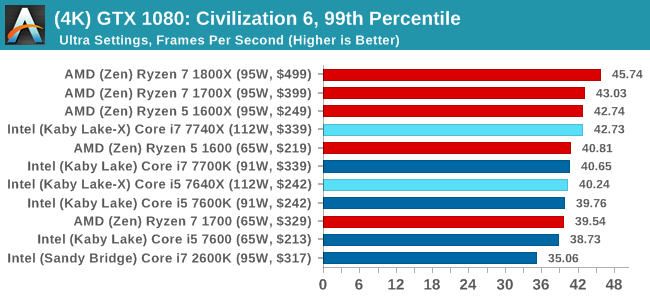
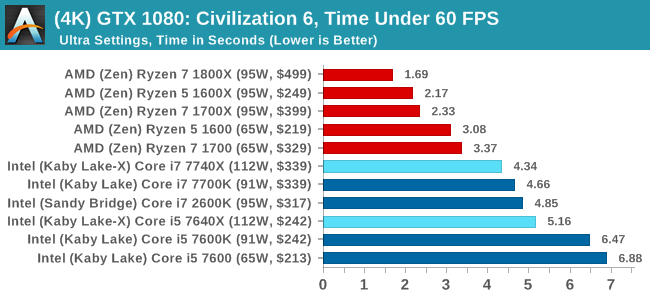
8K
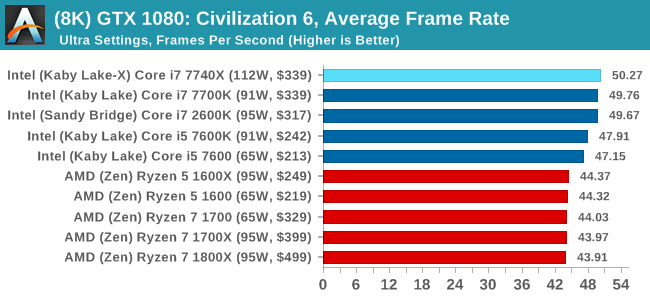
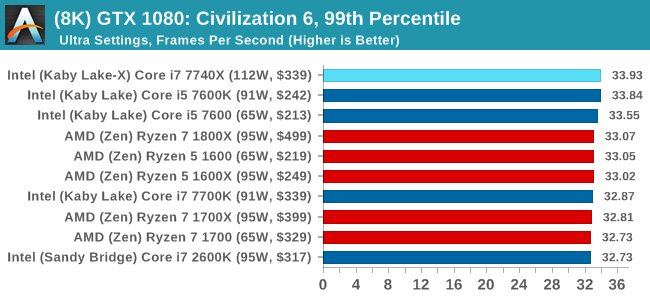
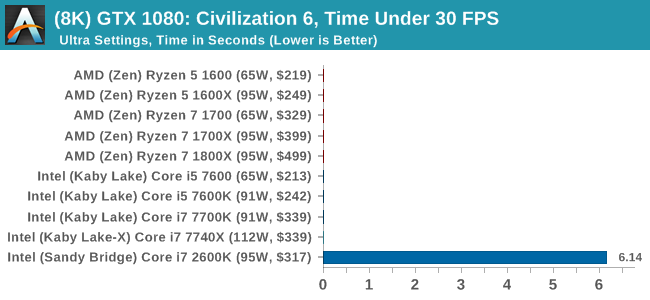
16K
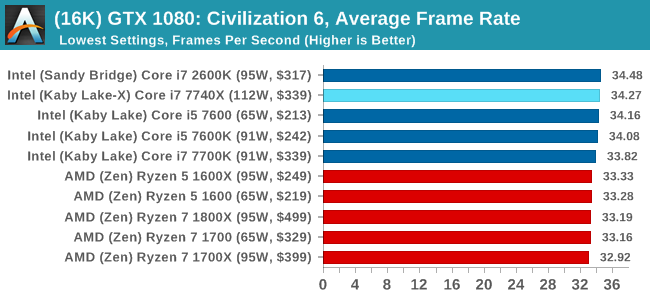
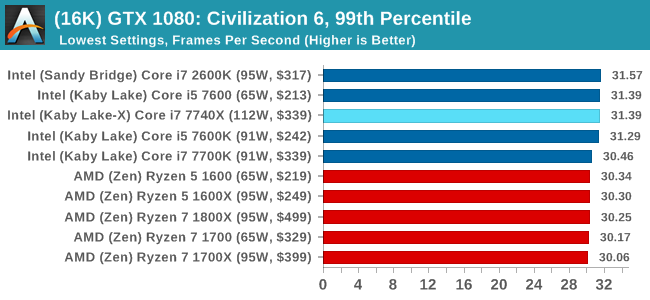
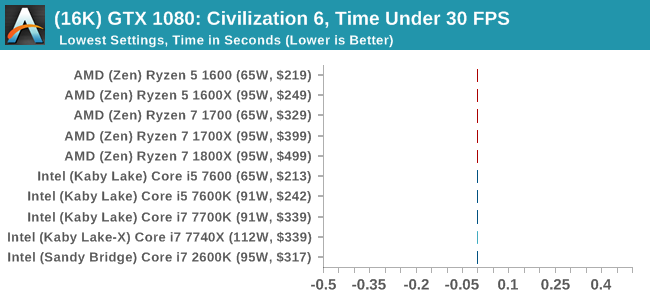
ASUS GTX 1060 Strix 6GB Performance

1080p

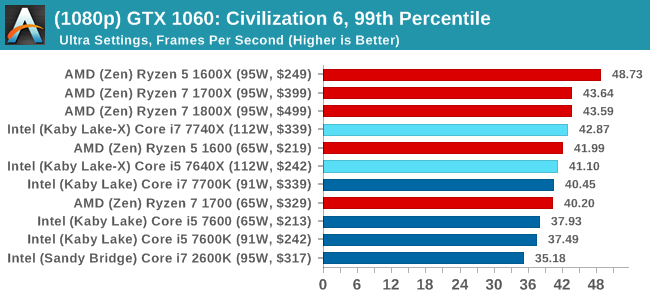
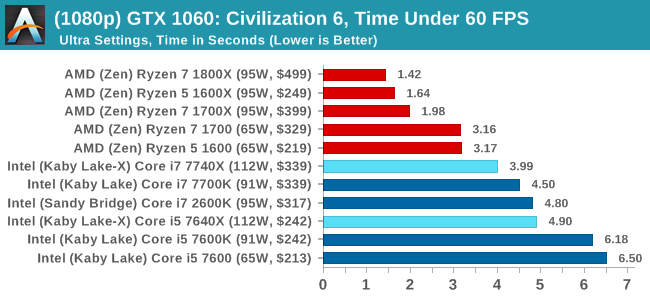
4K
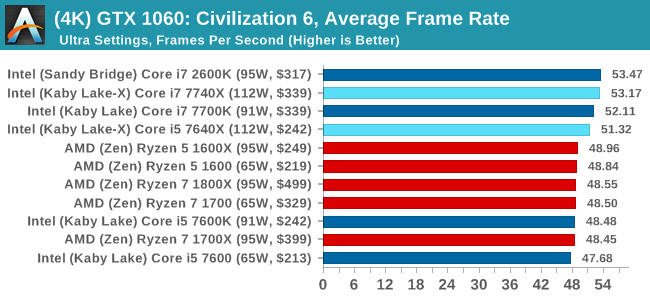
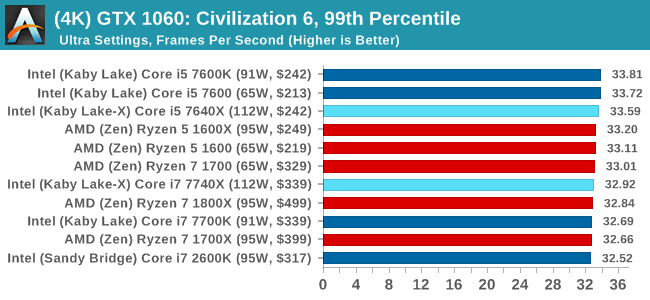
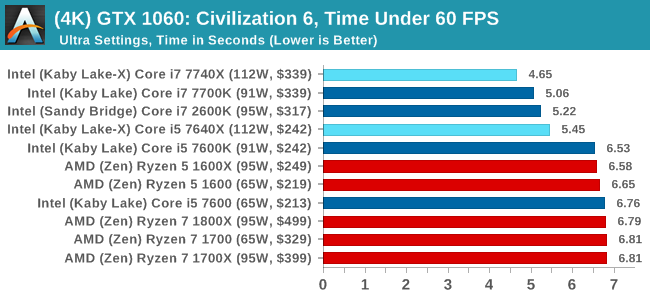
Sapphire R9 Fury 4GB Performance
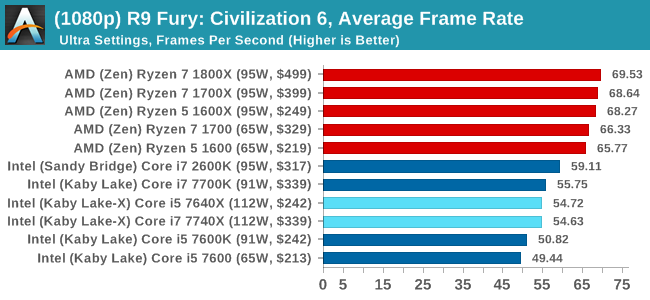
1080p

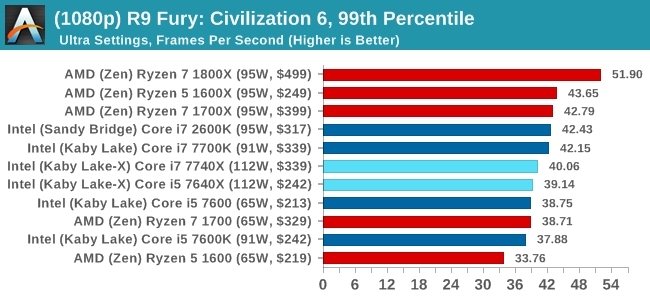
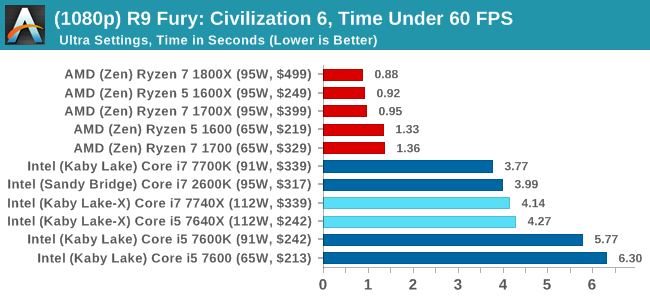
4K
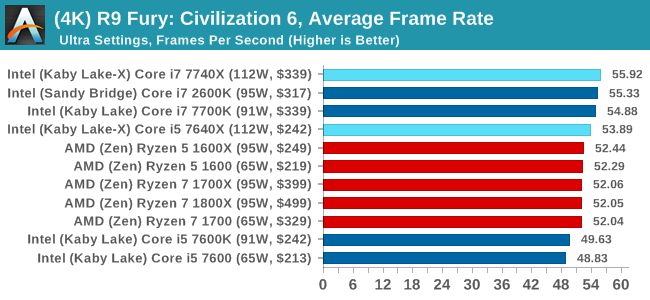
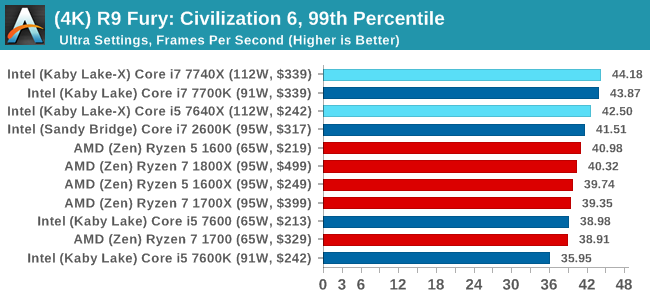
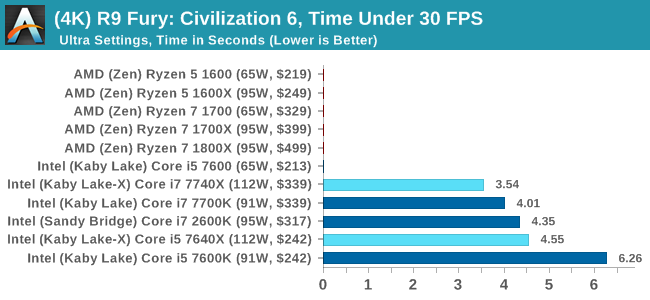
Sapphire RX 480 8GB Performance
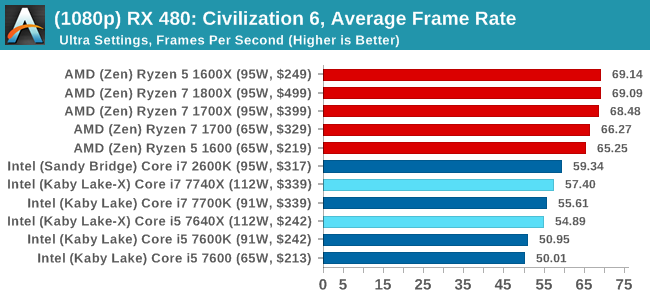
1080p

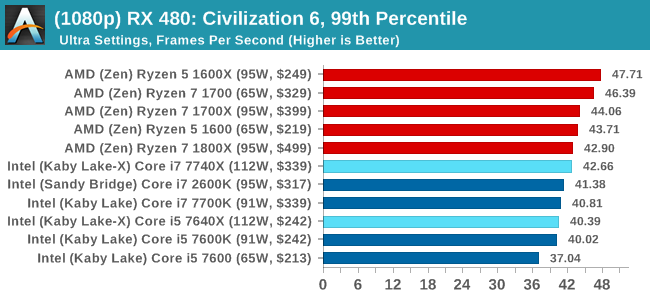
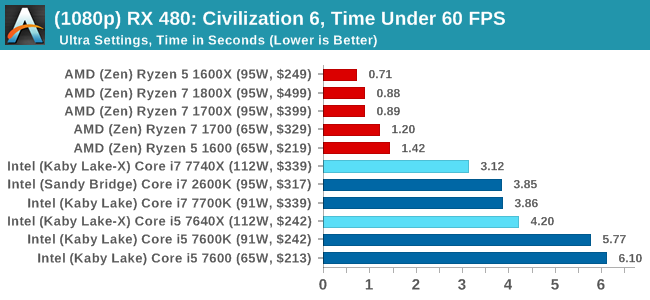
4K
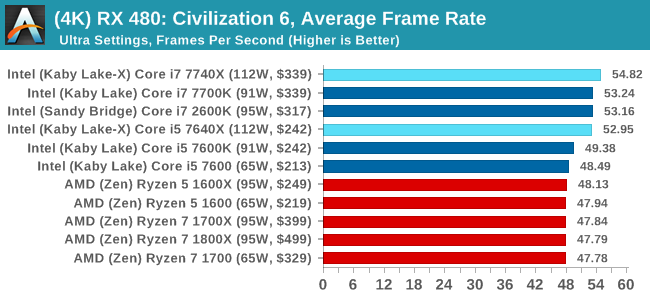
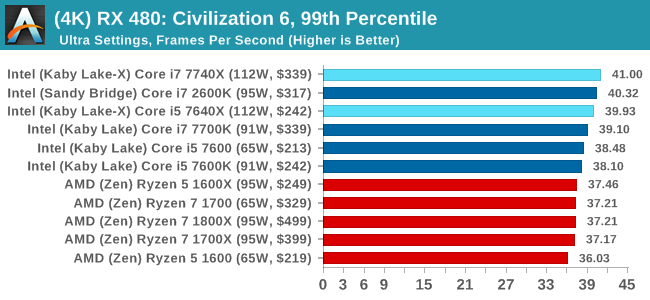
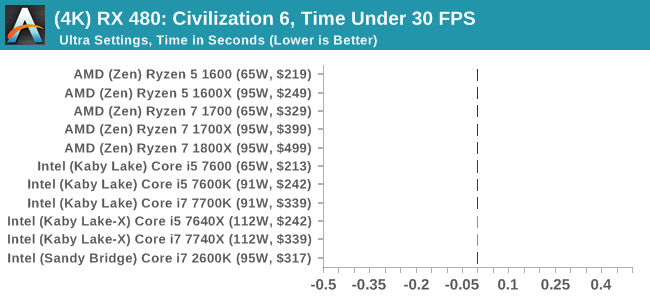
Civilization 6 Conclusion
In all our testing scenarios, AMD wins at 1080p with minor margins on the frame rates but considerable gains in the time under analysis. Intel pushes ahead in almost all of the 4K results, except with the time under analysis at 4K using an R9 Fury, perhaps indicating that AMD is offering a steadier range in its frame rate, despite the average being lower.



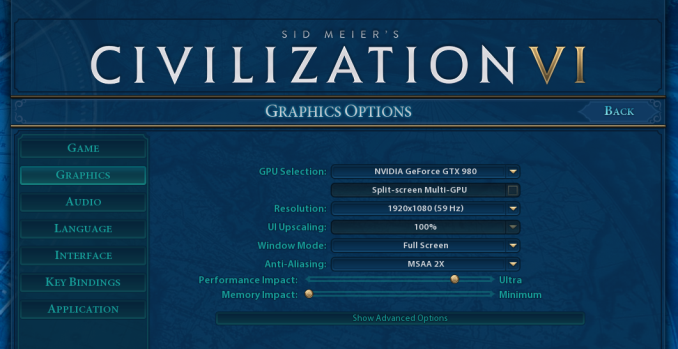








176 Comments
View All Comments
Chaser - Monday, July 24, 2017 - link
Go 2600K. LMAO!YukaKun - Monday, July 24, 2017 - link
Hey, I'm still using my 4.6Ghz 2700K, so these numbers bring joy to me!Cheers! :P
mapesdhs - Monday, July 24, 2017 - link
4.6? Outrageous! I would be offended if I were a 2700K at a mere 4.6! Get that thing up to 5.0 asap. 8) Mbd-dependent I suppose, but I've built seven 2700K systems so far, 5.0 every time, low noise and good temps. Marvelous chip. And oh yeah, 2GB/sec with a 950 Pro. 8)lowlymarine - Tuesday, July 25, 2017 - link
Either you're water cooling those systems, or you should consider investing in lottery tickets. My 2600k wouldn't push past 4.4 without very worrying amounts of voltage (1.4V+) and even 4.4 ran so hot I on my 212+ I settled for 4.2 to keep the core under 1.3V.soliloquist - Monday, July 24, 2017 - link
Yeah, Sandy Bridge is holding up nicely. Its pretty ridiculous actually.colonelclaw - Monday, July 24, 2017 - link
Wait, am I reading these graphs correctly? Unless I'm going mad, they seem to say that for gaming there's no need to upgrade if you already have a 2600K. Huh?If true, and I have no reason to doubt the data, that would make the 2600K one of the greatest processors ever?
Icehawk - Monday, July 24, 2017 - link
Yup, it's been said many times - if you have an i7 processor you really don't need to upgrade it for gaming, spend the money on a new GPU every few years. I have a 3700k & GF970, other than the video card the system is 6yrs old - I used to build a new one every other year. I've been considering the 7800\7820 though as I do a lot of encoding.Gothmoth - Monday, July 24, 2017 - link
"...Intel’s official line is about giving customers options. ..."yeah like.. if you want more PCI lanes to use all oyu mainboard features just buy the 999$ CPU..... LOL.
mapesdhs - Monday, July 24, 2017 - link
Indeed, just like the "option" of a CPU like the 4820K (4-core but with 40 lanes) suddenly vanished after X79. :D Intel's current lineup is an insult.Kalelovil - Monday, July 24, 2017 - link
Some mistakes for the Ryzen entries in the comparisons on page 1.PCI-E (Ryzen die has 20 lanes non-chipset, not 16), clockspeeds (too high), TDP (1700 is 65W).
Also, I see your point of comparing non-sale prices, but the 1700X seems to be widely and consistently available at near the i7-7740x MSRP. It's all but an official price cut.